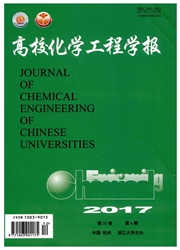

 中文摘要:
中文摘要:
通过检测最终产物的凝胶量、黏度等,结合不同体系聚合过程中粒径分布及动态表面张力变化,研究了分子量分别为1000、2000、4000、8000的聚乙二醇(PEG)对苯乙烯(St)/甲基丙烯酸甲酯(MMA)无皂乳液聚合体系稳定性的影响,并分析了机理。分子量会影响PEG在粒子上吸附的牢固程度以及与粒子的相互作用。PEG1000链长过短,易从粒子上脱落,无法有效起到位阻效应。PEG8000的链过长,易形成缠结或粒子间桥接,使脱析分离无法完成。分子量在2000~4000的PEG链长适中,既可以有效保护粒子而不易脱落,又不会过于缠结阻碍粒子运动,使体系的聚并-脱析过程能顺利完成。
 英文摘要:
英文摘要:
With measuring the amount of gel and viscosity of the end product, and combining with the process trends of particle size distribution and dynamic surface tension for various polymerization systems, the effects of poly(ethylene glycol) (PEG) molecular weight, which are 1000, 2000, 4000, 8000, respectively, on the stability of surfactant-free polymerization system consisting of styrene (St) and methyl methacrylate (MMA) in PEG aqueous solution were studied, and the stable mechanism of St/MMA surfactant-free polymerization in PEG aqueous solution was analyzed. The PEG molecular weight will affect the adsorption of PEG on the particles of the system and the interaction between the particles. PEG1000 is easy to detach from particle because its short chain length is unable to make the steric hindrance of PEG work effectively. For PEGS000, its overlength chain, which makes it tangle easily with each other, even bridging with other particles, needs more energy for separating it from particle pile. The molecular weight of PEG ranging from 2000 to 4000 has suitable chain length, so it does not detach easily from particles and at the same time can protect particles from irreversible flocculation, the movement of particle is not hindered by tangling and bridging of PEG, therefore, aggregate-separate process of the system can proceed successfully.
 同期刊论文项目
同期刊论文项目
 同项目期刊论文
同项目期刊论文
 Kinetic and Molecular Weight Modeling of Miniemulsion Polymerization Initiated by Oil-Soluble Initia
Kinetic and Molecular Weight Modeling of Miniemulsion Polymerization Initiated by Oil-Soluble Initia Amphiphilic quasi-block copolymers and their self-assembled nanoparticles via thermally induced inte
Amphiphilic quasi-block copolymers and their self-assembled nanoparticles via thermally induced inte Modeling for primary radical desorption in miniemulsion polymerization initiated by oil-soluble init
Modeling for primary radical desorption in miniemulsion polymerization initiated by oil-soluble init Highly enhanced toughness of interpenetrating network hydrogel by incorporating poly(ethylene glycol
Highly enhanced toughness of interpenetrating network hydrogel by incorporating poly(ethylene glycol Temperature and pH-dependent swelling and copper(II) adsorption of poly(N-isopropylacrylamide) copol
Temperature and pH-dependent swelling and copper(II) adsorption of poly(N-isopropylacrylamide) copol Unique multiple soluble-insoluble phase transitions in aqueous two-phase copolymerization of acrylam
Unique multiple soluble-insoluble phase transitions in aqueous two-phase copolymerization of acrylam Stabilizer-Free Aqueous Two-Phase Copolymerization of Acrylamide and Cationic Monomer: Role of Elect
Stabilizer-Free Aqueous Two-Phase Copolymerization of Acrylamide and Cationic Monomer: Role of Elect IBN partition between st monomer/polymer and water and its application in miniemulsion polymerizatio
IBN partition between st monomer/polymer and water and its application in miniemulsion polymerizatio Unusual Soluble-Insoluble-Soluble Phase Transition in Two-Phase Copolymerization of Acrylamide and a
Unusual Soluble-Insoluble-Soluble Phase Transition in Two-Phase Copolymerization of Acrylamide and a 期刊信息
期刊信息
